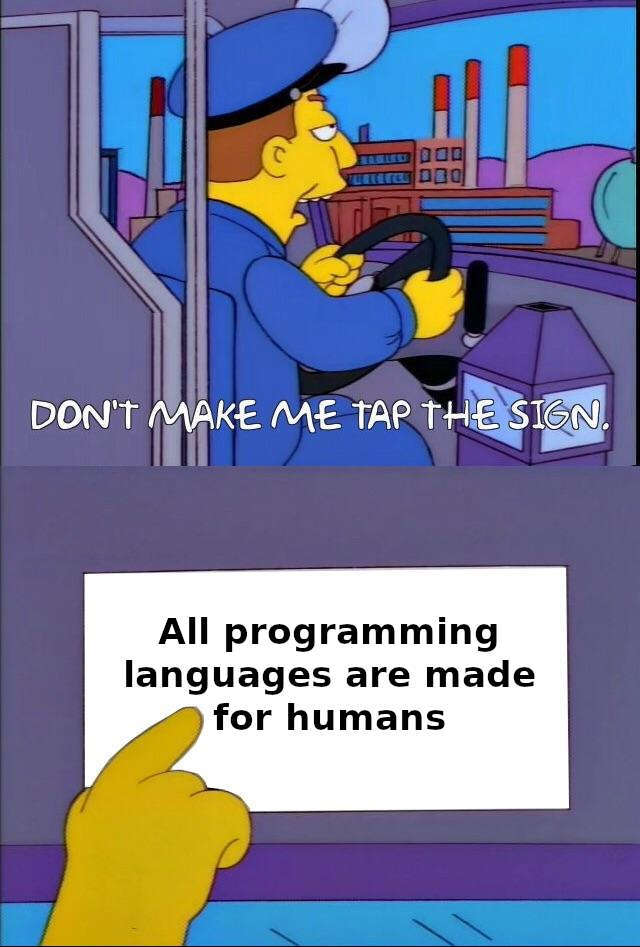All programming languages claim to be for humans. Doesn't make them good at it.
memes
Community rules
1. Be civil
No trolling, bigotry or other insulting / annoying behaviour
2. No politics
This is non-politics community. For political memes please go to [email protected]
3. No recent reposts
Check for reposts when posting a meme, you can only repost after 1 month
4. No bots
No bots without the express approval of the mods or the admins
5. No Spam/Ads
No advertisements or spam. This is an instance rule and the only way to live.
A collection of some classic Lemmy memes for your enjoyment
Sister communities
- [email protected] : Star Trek memes, chat and shitposts
- [email protected] : Lemmy Shitposts, anything and everything goes.
- [email protected] : Linux themed memes
- [email protected] : for those who love comic stories.
Nobody said all humans
Hey babe, wanna kill all humans?
Im sorry but which humans were whitespace and brainfuck made for.
Or Java?
For esolang nerds. They enjoy the existence of the language, not its usage
obviously the sadistic ones! those PLs certainly weren't made for the computer's benefit
If anything, that only proves the point even harder.
Wtf. Go look at the examples. W. T. F.
i don't think brainfuck or ook are actually meant for humans. more like against humans
They are very much aimed at humans.
Crafted to hurt humans, but still.
imho they're still made for humans. But the goal is to discuss them rather than code with them n_n
...there are languages that aren't written in plaintext???
I only code in emoji
Is this you?

I take it back
I'm sorry
I'm so, so sorry
Wouldn't you rather want to code in this? https://github.com/Gen-Alpha-Inc/skibidi-lang
I'm going to retreat to my safe space and write some shim code in C now, thx
I heard there was a programming language where you programmed a tree, that you could only manipulate manipulate in a "IDE" that looked a bit like Microsoft Word and saved the "source code" as a binary file.
Found the infos: https://youtu.be/vcFBwt1nu2Ut=479
Off the top of my head, Microsoft Excel, Max/MSP, and Piet
i don't usually cross-post my comments but I think this one from a cross-post of this meme in programmerhumor is worth sharing here:
The statement in this meme is false. There are many programming languages which can be written by humans but which are intended primarily to be generated by other programs (such as compilers for higher-level languages).
The distinction can sometimes be missed even by people who are successfully writing code in these languages; this comment from Jeffrey Friedl (author of the book Mastering Regular Expressions) stuck with me:
I’ve written full-fledged applications in PostScript – it can be done – but it’s important to remember that PostScript has been designed for machine-generated scripts. A human does not normally code in PostScript directly, but rather, they write a program in another language that produces PostScript to do what they want. (I realized this after having written said applications :-)) —Jeffrey
(there is a lot of fascinating history in that thread on his blog...)
PostScript was my first thought to. I guess these days WASM also applies.
I've kinda noticed this block when working with non-developers attempting low-code and no-code platforms. Anecdotally, non-coders tend to assume that knowing how to code is the hard part of software development. It's really not though, there's tons of resources to learn any language you want for free, and cs students cover all of the basics in their first year. The actually hard part (well one of them) is knowing what to code: the data structures and algorithms. Pro_code, low-code, or no-code, there's just no way around not knowing how to design a working, efficient algorithm or a clean, scalable database schema. Ironically, for anything but the most trivial problems, the lack of maturity in low-code platforms tends to only make the algorithm harder to implement.
I only code in binary-encoded programming languages.
Real programmers modulate their voice and scream precisely into the microphone such that the recorded audio file is valid machine code.

Though perhaps when AIs start actually coding, they're all going to just probably use the native instructions. Because why not?
Text code is overwhelming
Text is overwhelming (for me)
I like spaced out, low density information. I can process it better.
I wish I understood this point of view better. I crunch through information, so I want it to be densely packed. I'd love to know why and how this helps you so I can better help my peers that are like you?
I love how he said what he said and you dump this 5line paragraph on him 😘👌
Different brains.
When I took over programming for my robotics team in highschool I switched from whatever visual flowchart bullshit they were using to robotc. I can't make heads or tails of programming without actual words that literally say what the program does.
A lot of people really have difficulty with maths and programming.
The way i imagine it, programming is something non-real, something metaphysical, or how you want to call it. And a lot of people even plainly reject that such a thing meaningfully exists. Think about how many people reject the existence of "spirits", "demons", or "god", based on nothing else but the argument that it is not tangible. Something similar is going on with maths and programming.
I think it's "learned helplessness", sadly. https://en.m.wikipedia.org/wiki/Learned_helplessness
Like much of math, people are often eager to talk about the cool stuff and make it sound hard because they are proud they understood it. For a newcomer, this is just a brick in the face.
Exactly!
Literally everything we ever came up with is comprehensible by humans, and is likely to be comprehensible by a layman given enough time and making sure prerequisites are filled.
In fact, it takes a good explanation that would click with a given person's experience and level of expertise to make anyone understand anything.
It's just that sometimes people need that specific thing X, and normally it's needed to those who have some knowledge in another specific thing Y, and it gets expected that a person needing X knows Y (which is not necessarily true)
This is especially common in the world of computers. Everyone uses them, everyone has to troubleshoot them, but not everyone is the system administrator, to which 85% of the guides often seem to be addressed.
People who know math make math sound hard? Eehh, that does not seem to track. Math can become incredibly difficult, and even the cryptic terminologies are a way to alleviate the difficulty.
LLVM IR wasn't made for humans
It... Kind of was though, IR gives us a way to translate higher level concepts to lower (but not the lowest) level representation. It also gives us a way to optimize before machine translation.
It took me looking at unfamiliar programming languages and realizing that I could read most of them without really knowing them for me to realize I probably could learn to at least read another language.
It's been years since then and I'm still probably shit at Spanish, but just like programming languages regular languages were made by humans to communicate with other humans, you're capable of understanding any of them given a reasonable amount of time and guidance.
Maybe I'm an old fogey, but I usually hear more pushback against visual languages as being too finicky to actually create anything with and I usually advocate for a blending of them, like working in Godot and having nodes to organize behaviour but written scripts to implement it.
I really appreciate the talks from Bret Victor, like Inventing on Principle (https://youtu.be/PUv66718DII), where he makes some great points about what sorts of things our tooling, in addition to the language, could do to offload some of the cognitive load while coding. I think it's a great direction to be thinking, where it's feasible anyways.
Also, one reason folks new to programming at least struggle with text code is that they don't have the patterns built up. When you're experienced and look at a block of code, you usually don't see each keyword, you see the concept. You see a list comprehension in Python and instantly go "Oh it's a filter", or you see a nested loop and go "Oh it's doing a row/column traversal of a 2d matrix". A newbie just sees symbols and keywords and pieces each one together individually.
What is non-plain-tezxt code?
'Nocode', scratch, NODE-red, etc.
Programs are meant to be read by humans and only incidentally for computers to execute
